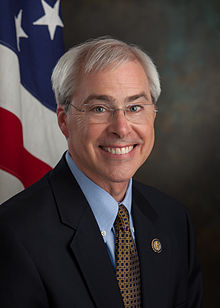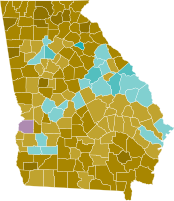
Clarence Saxby Chambliss is an American lawyer and retired politician who was a United States Senator from Georgia from 2003 to 2015. A member of the Republican Party, he previously served as a U.S. Representative from 1995 to 2003.
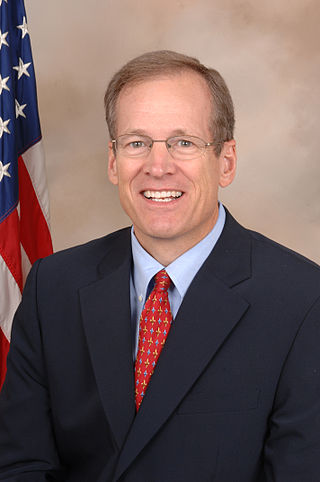
John Heddens Kingston is an American businessman, lobbyist, and politician who served as U.S. representative for Georgia's 1st congressional district in southeast Georgia, serving from 1993 to 2015. He is a member of the Republican Party and was part of the House leadership (2002–06) when he served as vice-chair of the Republican Conference. In 2014, he ran for the U.S. Senate seat occupied by retiring senator Saxby Chambliss and advanced beyond the May 20 primary to the July 22 runoff, where he was defeated by David Perdue.

Charles Whitlow Norwood Jr. was an American politician who served as a Republican member of the United States House of Representatives from 1995 until his death in 2007. At the time of his death, Norwood was the representative of the 10th District of Georgia.

Othell Maxie Burns Jr. is an American politician and academic from the state of Georgia. A member of the Republican Party, Burns has represented the 23rd district in the Georgia State Senate since January 2021. He previously served in the United States House of Representatives from 2003 to 2005, representing Georgia's 12th congressional district. From 2012 to 2017 he was the president of Gordon State College in Barnesville, Georgia.

Elections in Georgia are held to fill various state and federal seats. Regular elections are held every even year. The positions being decided each year varies, as the terms of office varies. The State Senate, State House and U.S. House will typically be up for election, as all of those positions have two-year terms. Special elections are held to fill vacated offices. Georgia is one of seven states that require a run-off election if no candidate receives a majority of the vote in a primary election. Uniquely, Georgia requires a run-off election for state and congressional offices if no candidate wins a majority of the vote in a general election; only Louisiana has a similar requirement, but it operates under a different election system.
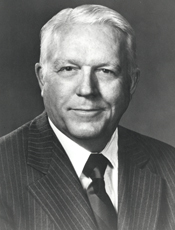
John James Flynt Jr. was an American Democratic Party politician who served in the United States House of Representatives for two congressional districts in Georgia from 1954 to 1979. Upon his retirement from the House, he was succeeded by future House Speaker Newt Gingrich, whom Flynt had narrowly defeated in the two previous elections.
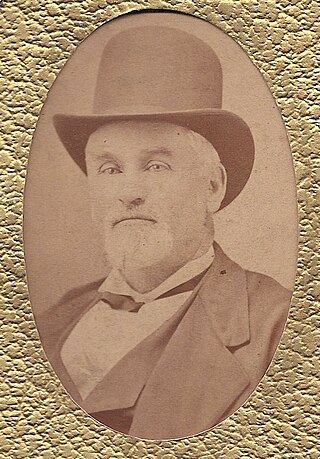
Stephen Alfestus Corker was an American, lawyer, and Civil War veteran on the Confederate side who served briefly as a U.S. Representative from Georgia in early 1871. He was a plantation owner and slaveholder.
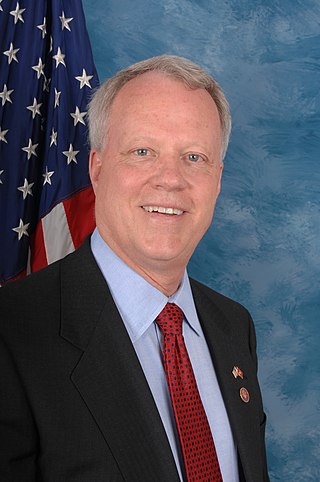
Paul Collins Broun Jr. is an American physician and politician who served as the U.S. representative for Georgia's 10th congressional district from 2007 to 2015. He is a member of the Republican Party and was a member of the Tea Party Caucus.

Jody Brownlow Hice is an American politician, radio show host, and political activist who served as the U.S. representative for Georgia's 10th congressional district from 2015 to 2023. He is a member of the Republican Party.

Elections were held on November 2, 2010, to determine Georgia's 13 members of the United States House of Representatives. Representatives were elected for two-year terms to serve in the 112th United States Congress from January 3, 2011, until January 3, 2013. Primary elections were held on July 20, 2010, and primary runoff elections were held on August 10, 2010.
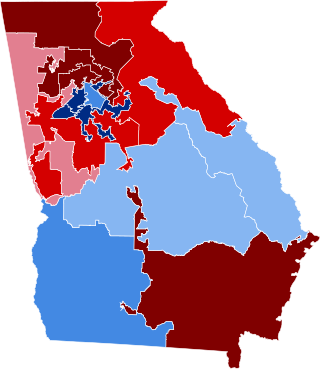
The 2004 House elections in Georgia occurred on November 2, 2004, to elect the members of the state of Georgia's delegation to the United States House of Representatives. Georgia has thirteen seats in the House, apportioned according to the 2000 United States census.

The 2002 House elections in Georgia occurred on November 5, 2002 to elect the members of the State of Georgia's delegation to the United States House of Representatives. Georgia has thirteen seats in the House, apportioned according to the 2000 United States census.
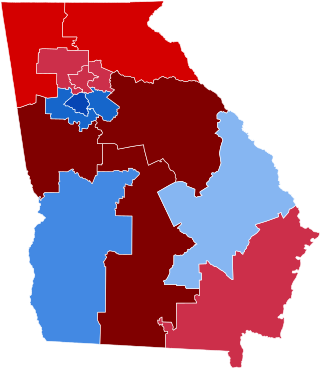
The 2012 United States House of Representatives elections in Georgia were held on Tuesday, November 6, 2012, and elected the 14 U.S. Representatives from the state, one from each of the state's 14 congressional districts, an increase of one seat following the 2010 United States census. The elections coincided with the elections of other federal and state offices, including a quadrennial presidential election. The party primary elections were held on July 31, 2012, and the run-off on August 21, 2012.
Lee Ivey Anderson is a Republican member of the Georgia State Senate, representing the 24th district.

The 2014 United States House of Representatives elections in Georgia were held on Tuesday, November 4, 2014, to elect the 14 U.S. representatives from the state of Georgia, one from each of the state's 14 congressional districts. The elections coincided with the elections of other federal and state offices, including Governor of Georgia and U.S. Senator.

Richard Wayne Allen is an American politician who has served as the U.S. representative for Georgia's 12th congressional district since 2015. He is a member of the Republican Party.

Bradford Jay Raffensperger is an American businessman, civil engineer, and politician serving as the Secretary of State of Georgia since 2019. A member of the Republican Party, he previously served in the Georgia House of Representatives, representing District 50.

The 2020 United States presidential election in Georgia was held on Tuesday, November 3, 2020, as part of the 2020 United States presidential election in which all 50 states plus the District of Columbia participated. Georgia voters chose electors to represent them in the Electoral College via a popular vote, pitting the Republican Party's nominee, incumbent President Donald Trump of Florida, and running mate Vice President Mike Pence of Indiana against Democratic Party nominee, former Vice President Joe Biden of Delaware, and his running mate Senator Kamala Harris of California. Georgia has 16 electoral votes in the Electoral College.

Andrew Scott Clyde is an American politician and gun store owner from the state of Georgia. A Republican, Clyde represents Georgia's 9th congressional district in the United States House of Representatives, assuming office in 2021. The district serves a large swath of exurban and rural territory northeast of Atlanta, including Gainesville, Toccoa, Hartwell and Dahlonega.

The 2022 Georgia Secretary of State election was held on November 8, 2022, to elect the Secretary of State of Georgia. Incumbent Republican Secretary of State Brad Raffensperger won re-election to a second term. Raffensperger emerged as a major national figure in early January, 2021 when he faced significant pressure from then-President Donald Trump to overturn the 2020 presidential election in Georgia. The party primary elections took place on May 24, with runoffs scheduled for June 21. Trump had been taped in a phone call asking Raffensperger to "find 11,780 votes," the exact number needed for Trump to carry the state.
